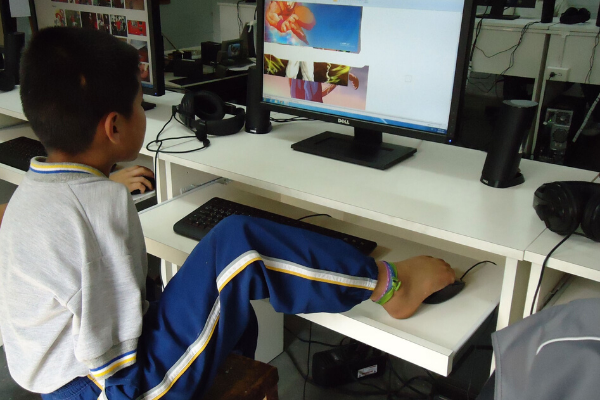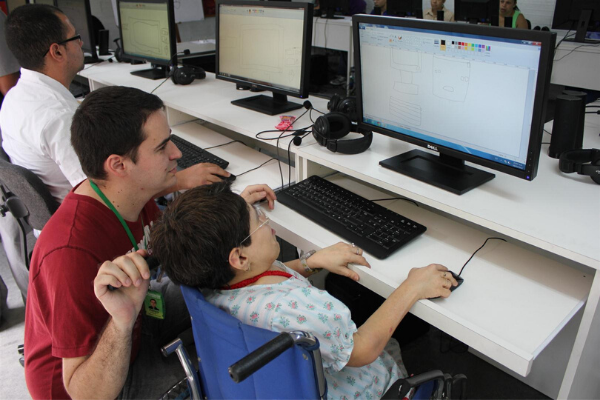Project execution: April de 2012 – Currently
Location: Medellín, Colombia
Beneficiaries:
People with disabilities (children, young people, adults, elders).
Project execution: April de 2012 – Currently
Location: Medellín, Colombia
Beneficiaries:
People with disabilities (children, young people, adults, elders).
Partners:
Social organizations that care for people with a disability.
Individual donors through GlobalGiving
People with disabilities face important barriers to access to education, which hinders their economic and social development. ICTs provide them with development opportunities that will allow them to grow at an economic, recreational and persona level. However in many cases ICTs do not adapt to the specific circumstances of people with physical and cognitive disabilities. The lack of access to these tools denies them the possibility to fully seize opportunities that can improve their lives.
MAKAIA designed a Project that comprehend a coordinated work with other organizations in order to offer ICT training as a relevant tool for people with disabilities to improve their living conditions and we also provide vocational training that guides them toward their integral development. Additionally the project includes the development and use of technological support devices, which are specifically designed to reduce the difficulties of people with physical disabilities when they use ICTs. This allows people with disabilities to play an active role in society and reduce the opportunity access gap they face in their daily lives.
Through the crowfounding platform GlobalGiving, we have gathered resources to carry out this project of support the intervention in the use and adoption of technologies of more than 3.437 people.
Highlighted Activities in 2019:
In 2019, 14 deaf people were part of a digital literacy process in which they developed habilities with tools that allow them to do administrative processes such as budget tracking and document construction. This training aimed to enhance their digital skills to facilitate their access to employment.
In 2018 we benefited 61 people an 3 organizations.
Highlighted activities in 2018:
In February and May, we developed two training processes with an emphasis on employability. The one in February was attended by 20 people and in May, 15 participated. Both days were held in partnership with the EPM Public Library, who lend the facilities for the development of the trainings.

On June 1, 2018, a cooperation agreement was signed with Comfenalco, with the objective of “Combining mutual cooperation efforts to build and implement ICT training projects for vulnerable population, through innovative methodologies and technological tools, as well as as the exchange of human resources, intellectuals and physical spaces”. From this alliance, a 24-hour training session with an emphasis on employability was carried out between July 30 and August 3. In total 20 people with hearing disabilities attended the event, who had the opportunity to approach technology to complement knowledge in customer service, strengthening their work skills by building databases and formats, managing information and creating their worksheet. lifetime. Additionally, 3 of them had the opportunity to have job interviews managed by Comfenalco through the Public Employment Service office.
Finally, we held a new workshop on October 11 and 16, in the Belén Library Park, in a 6-hour training session with 6 people with hearing impairment that strengthened their knowledge in use and adoption of technology.
In 2017 we benefited 45 people and 3 organizations.
Highlighted activities 2017:
We work with organizations that serve population in situations of disability, providing training and information to identify the risks to which they are exposed with the use of the Internet and generate parental support and mediation for the proper use of these technological devices. Likewise, we provide methodological tools and strategies for officials to carry out training activities using technology, generating added value to their daily work.
We began strengthening the technological skills of people with hearing disabilities in employability issues.
Likewise, in the first semester of 2017, two GlobalGiving representatives were in Medellin visiting the social organizations that receive support for their projects through their platform. MAKAIA coordinated the visit to some organizations benefited by means of these resources, to measure the satisfaction of the organizations and users when receiving the accompaniment.
Highlighted activities in 2016:
We worked with 5 organizations: Amigos con Calor Humano, Discapacidad sin Barreras – Aula abierta, Mónica Uribe por amor, Óyeme y El Comité de Rehabilitación, developing the following actions:
Training in topics of digital communication, social networks, appropriation of ICT, education softwares, G-Suite, cloud computing and tools for collaborative work.
Analysis of their digital maturity and installation of technological capabilities so that they can access knowledge and experience in ICT and thus contribute to the personal and social development of their target audience.
Ensuring an efficient appropriation of the members of the organization and its beneficiaries so that it can be involved in their lives and thus facilitate their daily activities
Access to our international cooperation platform Nodo Ká and hand in hand with our local partner, Ruta N, they are developing their sustainable work plan.
Thus, we generate a broad impact on the population in a situation of disability, strengthening the capacities of the social organizations that work in this sector. All these actions have contributed to the development of opportunities that allow people with disabilities to grow economically, professionally and personally.
